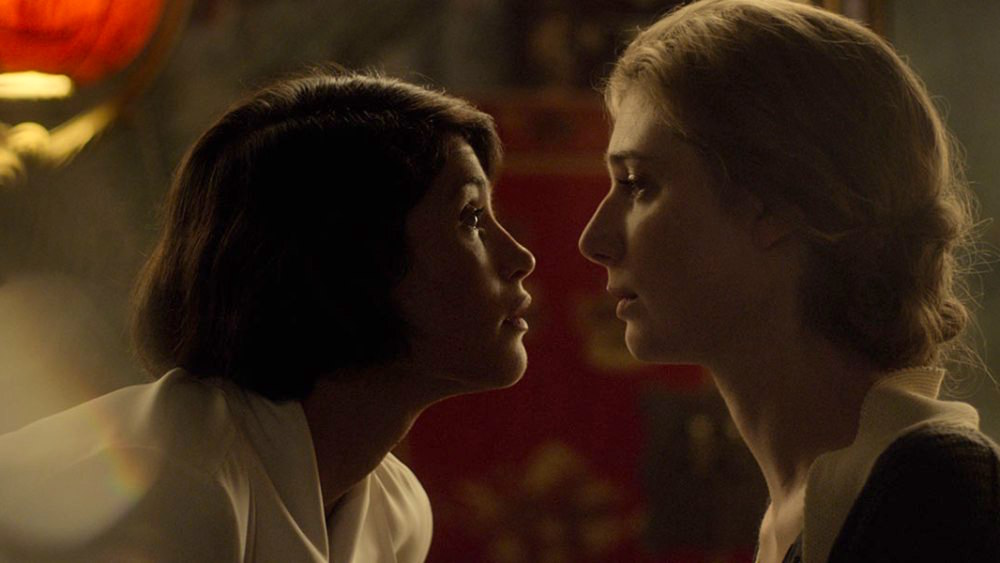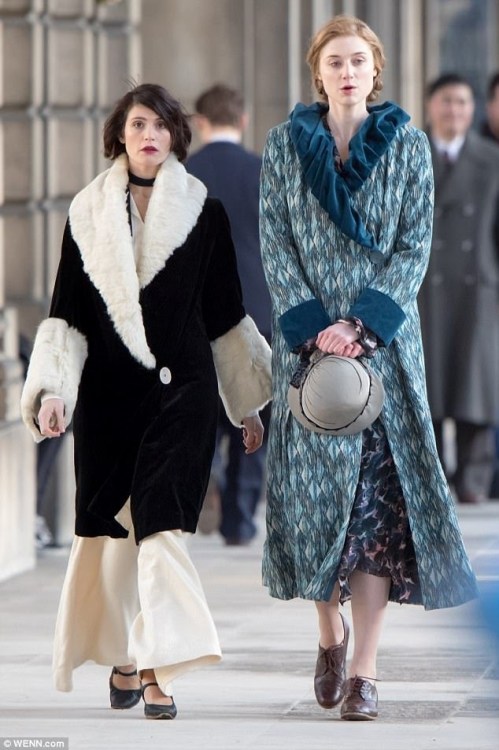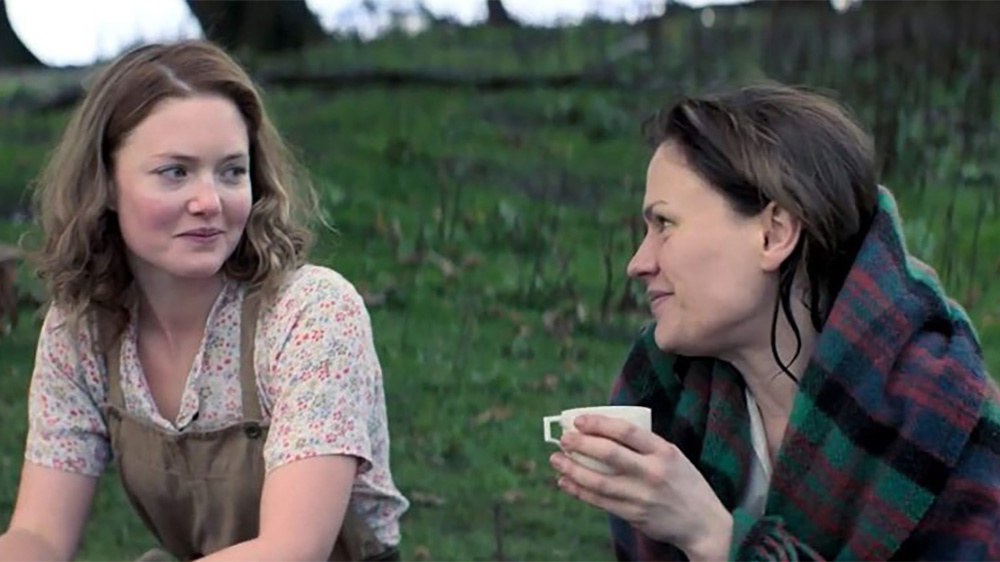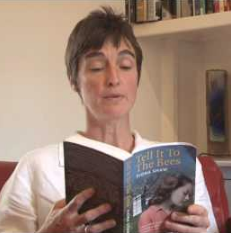Nathaniel R trying to catch up on those festival reviews!
Herewith two films about married women breaking out of their heteronormative bonds for passionate lesbian affairs. And what I thought were two movies written by famous actresses though, in fact, only one was...

What would Virginia Woolf make of the multiple cinematic attempts to capture her enigmatic persona in two hours flat? Hell, what did the literary icon make of the movies themselves since they were invented in her lifetime? If I'm ever able to interview Woolf expert, actress/writer Dame Eileen Atkins, I plan to ask her. Woolf was most famously played onscreen by Nicole Kidman in The Hours in which Atkins had a small role. Now it's the ever bewitching Elizabeth Debicki's turn in Vita and Virginia, written by Atkins from her play of the same name...
The character we get to know first, though, is gossip magnet Vita Sackville-West (Gemma Arterton, having fun with a flamboyant role), a socialite and best selling author who is prone to disappearing for passionate sapphic affairs until she locks herself back in her gilded cage with Sir Harold Nicholson (Rupert Penry Jones), her diplomat husband. We meet them as they appear on a radio show talking about "the modern marriage" and we glean that they're more like longtime best friends who both enjoy their same sex dalliances on the side with each other as steadying half-platonic partner. Not that all is domestic bliss. Vita's disapproving mother (played by Isabella Rosselinni, doing it up too big) pops in from time to time to purse her lips and dress Vita down for her "shocking" (read: lesbian) behavior. But mostly Vita is all cheery flibbertigibbet libido and when she sees Woolf, a genius celebrity in these bohemian circles, her next conquest is clear.
Though Vita is not without her complexities, the film is mostly content to view her as a regular human, albeit a charismatic one. When Woolf enters, though, we get the cinematic showmanship reserved for the gods among us. Hazy reveries, big musical themes on the score, dramatic door slammings (a chalk "x" means she's writing), and monologues in rooms filled with smoke that everyone stops to listen to. The latter are meant to be train of thought casual but most people couldn't deliver anything this profound if they spent weeks trying to craft one. Debicki's statuesque 6'2" foot plus figure is well used here (in real life Woolf was average in height but of COURSE "Virginia Woolf" towers over everyone, man and woman alike). Though Debicki remains compulsively watchable the performance lacks the scalpel-sharp myth-making potency of Kidman's Oscar-winning turn.
 That's not necessarily a mark against Debicki just the reality of a film that's focused less on Woolf's intellect, and otherwordly creative gifts (have you ever read her books? You must!) but on the decidely more commonplace matters of erotic infatuation and sexual experimentation. The bulk of the film is the detailing of how the scandal-plagued Vita won Virginia's heart and body... for a short spell at least. The affair inspired Woolf's utterly genius novel "Orlando" (which in turn became a remarkable film).
That's not necessarily a mark against Debicki just the reality of a film that's focused less on Woolf's intellect, and otherwordly creative gifts (have you ever read her books? You must!) but on the decidely more commonplace matters of erotic infatuation and sexual experimentation. The bulk of the film is the detailing of how the scandal-plagued Vita won Virginia's heart and body... for a short spell at least. The affair inspired Woolf's utterly genius novel "Orlando" (which in turn became a remarkable film).
Like Debicki the film is always watchable with its colorful characters. In fact, practically everyone we meet is a 'character' except of course for long-suffering protective Leonard Woolf. The randy topic is also moving -- Woolf admittedly had trouble with sex so she's reluctant to engage -- though it never digs as deeply as you're hoping it might. Not every choice the actors or emerging director Chanya Button make is fruitful. One recurring CG visual flourish involving vines and blooming plants is try-hard and distracting, the score (perhaps taking its cue from The Hours) is repetitive and overbearing, and the psychological of the characters can be a smidge fuzzy due to the admirable large ground its covering while also zeroing in on a short time frame. But some flourishes do work. Button deploys the direct-to-camera monologue /letter writing that worked so well in The Age of Innocence with panache, Atkins using the real letters from these women in the script from my understanding.
Despite its hit and miss qualities, we're firmly on the hit side. Vita and Virginia also affords us the chance to watch smart women banter, philosophize, argue, and aggressively pursue their own desires, leaving the men to play the supportive worrying spouse for a change (Penry-Jones is particularly fine among the supporting cast). In this particular regard, the movie is a rare and real winner.
Grade: B
Distribution: It will be released in the UK but so far no US plans. We're expecting that will change, though.

TELL IT TO THE BEES
Listen, not every festival indie seeking distribution can be a hidden gem. Try to imagine if you will, a schmaltzy Hallmark style treatment of a movie about an emotional and carnal love affair between an abused wife and a town pariah female doctor (*gasp*) in which bees perform magical realist feats and it's all seen through the eyes of a little femme boy narrating as a grown implied-gay man. Hard to picture right? It's kind of adorable, though, even when it's... qualitatively questionable.
Anna Paquin, with all her contemporary twitches and ticks, plays the town doctor. She's an odd fit for a gentle period picture so it's almost a relief when things get twitchier and more hysteric in the plot to better suit her. Still, it's nice to see a queer actor get a queer role for a change (Paquin has been very vocal about her bisexuality over the years). Rising actress Holliday Grainger (Tulip Fever, My Cousin Rachel), a much less fussy actress, plays the abandoned wife and suddenly single mother who initially views the kind doctor as a helping hand but eventually comes to love her.
Grade: C
Distribution: No distributor yet.
 Fiona Shaw the author.P.S. One funny note! The film is based on the book of the same name by Fiona Shaw and I mistakenly thought it was the ACTRESS Fiona Shaw and I'd made up this whole story in my head about how Anna Paquin was cast because Shaw suggested her after their time together on Season 4 of True Blood. I was so excited for the Q&A after the TIFF screening because I love me some Fiona Shaw. Then, out walked this other woman! Who knew that there were two brunette British lesbians of the same generation with the same name but one was a writer and one an actress? This is the writer. This is the actress. Apparently I'm not the only journalist who made the assumption that they were the same person.
Fiona Shaw the author.P.S. One funny note! The film is based on the book of the same name by Fiona Shaw and I mistakenly thought it was the ACTRESS Fiona Shaw and I'd made up this whole story in my head about how Anna Paquin was cast because Shaw suggested her after their time together on Season 4 of True Blood. I was so excited for the Q&A after the TIFF screening because I love me some Fiona Shaw. Then, out walked this other woman! Who knew that there were two brunette British lesbians of the same generation with the same name but one was a writer and one an actress? This is the writer. This is the actress. Apparently I'm not the only journalist who made the assumption that they were the same person.